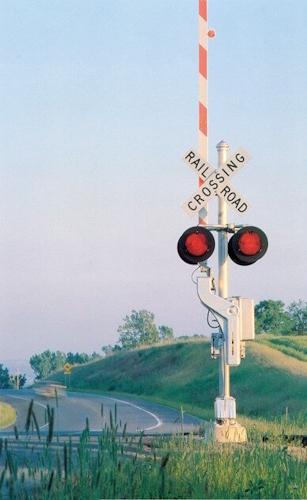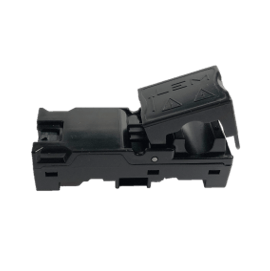Innovative Trackside Transducers for Modern Rail Maintenance
The rail industry is continually evolving. The privatization of rail networks has introduced new requirements, such as the need for rail maintenance through the monitoring of point machines (switches) and signaling conditions. LEM addresses these standards with its trackside transducer ranges.
LEM offers consistent control and protection signals for both on-board and wayside applications.
With four decades of railway experience, LEM is well-equipped to assist in adapting to these evolving technical applications. As a market leader with a global presence, LEM is dedicated to ensuring the efficient, safe, and reliable operation of railways.
Typical Applications for Trackside Sensors

- Point Machines: Monitoring the current of point machines helps detect mechanical issues early.
- Crossing Gates: Ensuring the proper operation of crossing gates by monitoring their current usage.
- Signaling Systems: Maintaining the reliability of signaling systems by tracking their current consumption.
- Track Circuits: Detecting the presence of trains on the track sections by monitoring electrical circuits, ensuring safe train operations.
- Substations (Circuit Breaker for Transformers): Monitoring current in substations helps manage the electrical load and protect transformers from overloads.
- Control and Safety Systems: Current sensors are integral to control and safety systems, ensuring the proper functioning of various trackside equipment and enhancing overall safety.
Trackside Electric Point Motors current measurement
For example, the current of the electric motor of a point machine can be measured by a current transducer and with this can be monitored. Any variation from the normal current waveform indicates an early warming of equipment failure that will require preventive maintenance. A quick scheduled maintenance intervention will allow not to interrupt the rail traffic for a lot of costs saving.
Control of trackside equipment such as point motors requires accurate measurement of current – it also increasingly demands the ability to send data to digital monitoring solutions. And all this in a robust, yet compact package
LEM’s HTRS series of current sensors introduces a new core technology that provides improved performance while addressing the limitations of traditional split core designs.

HTRS Series
- 10A – 30A – 50A nominal current
- DC and AC measurement
- 4 – 20mA output
- High insulation level (> 1000V CATII, PD2)
- Split core design with excellent performance
The Preventive Maintenance of Point Machines
About 25 % of disturbances causing trains delays are due to the point machines along the tracks. Their preventive maintenance, with potential replacement prior to failure, is a way of improvement thanks to their conditioned monitoring.
The output from a sensor measuring the DC (or AC) current drawn by the point motor is logged to produce an operational profile of current against time. This is then stored within a data logging system and used as the control characteristic. This “footprint” forms the basis of comparison for any future measurements. As time elapses, changes in this electrical footprint can indicate mechanical wear, lack of lubrication, jamming within the point mechanism (ie. caused by ballast), electrical motor and winding failure, and point misalignment, all identified by an increase in total current drawn. Any variation from the normal footprint also indicates the likelihood of other incipient problems – wear, rust, debris, vandalism...
Using current profile monitoring before problems or a critical breakdown occurs, an early warning of machine failure is provided to signal preventive maintenance. When necessary, the replacement of material is performed with supporting evidence (i.e. current profile records). This optimizes the efficiency of the railway maintenance staff, minimizes the traffic disruption and keeps costs to an acceptable level.
Products for Railway Trackside Systems
In trackside applications, current sensors are crucial for monitoring and maintaining equipment. They are used in systems such as audio frequency track circuits with continuously welded tracks and lamp monitoring.
LEM’s trackside sensors are specifically designed to monitor motor behavior, anticipate failures, reduce downtime, and optimize lifecycle costs.
| |||||
|---|---|---|---|---|---|
| Bandwidth | 30kHz | 300kHz | 100kHz | 1000kHz | 1kHz |
| Consumption | 50mA | 20mA | 140mA – 280mA | 80mA – 140mA | 50mA – 65mA |
| Current Range Max | 20A | 20A – 150A | 42kA | 9000A | 25A – 30A |
| Supply Voltage | 24V | 5V | 12V – 24V | 12V – 24V | 24V |
| Mounting | Panel | PCB | On Primary Fastening | On Primary Fastening | Panel |
| Output | Current | Voltage | Voltage | Voltage | Current |
| Overall Accuracy | 2% - 5% | 0.7% - 0.5% | 0.5% | 0.65% | 1% - 2% |
| Technology | Open Loop Hall Effect | Closed Loop Hall Effect | Open Loop Coreless Integral | Open Loop Coreless Integral | Closed Loop Hall Effect |
Certificates and standards
LEM transducers are CE marked in recognition of their electromagnetic compatibility and their compliance to EMC standards. Their reference standard is EN 50155 for the electrical performance and environmental constraints as well as EN 50124-1 for creepage and clearance distances design versus the required insulation levels.
Our head office in Geneva, LEM SA, is IRIS certified since September 2007. This certification will soon become a real system of reference for the market players. IRIS will supplement the ISO 9001 certification principles with the specific needs for the traction and trackside market demands.
QUALITY PRODUCTS AND SERVICES: OUR PRIORITY
Leveraging our extensive expertise in applications and current measurement technologies, LEM creates both standard and custom products that can be precisely tailored to meet your performance, space, and cost requirements.
PRODUCT DOCUMENTATION
Discover LEM's advanced technologies tailored for trackside applications. Our expertise in the railway sector extends beyond trackside solutions, offering innovative approaches for railway traction applications as well.
Dive into the details and access our brochure for a thorough and informative exploration.
NEED SUPPORT ON YOUR PROJECT?
You have a project in line with that application and want to discuss it with LEM?
Click on the contact button below and our experts will help you find the best solutions for your needs.